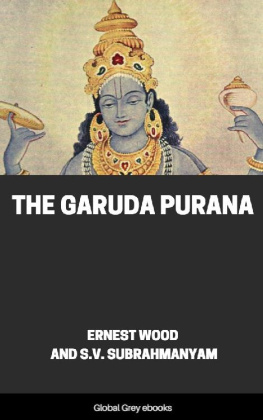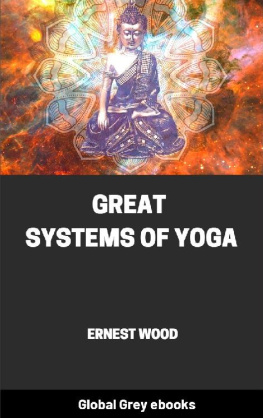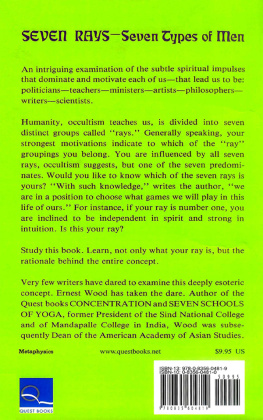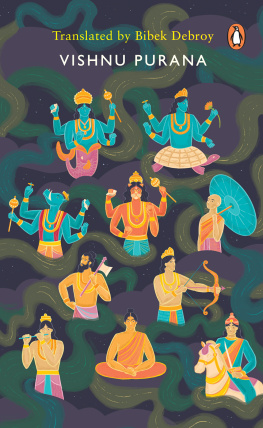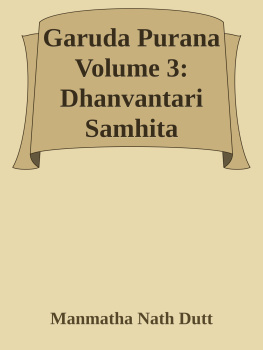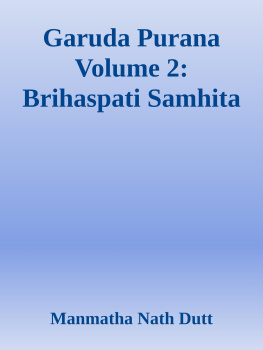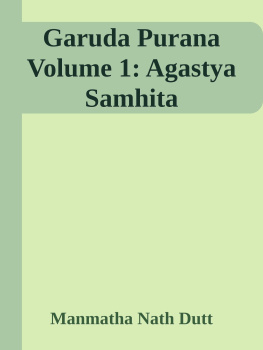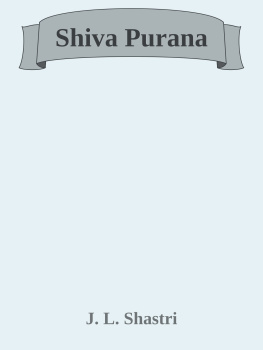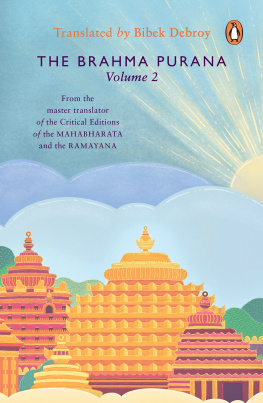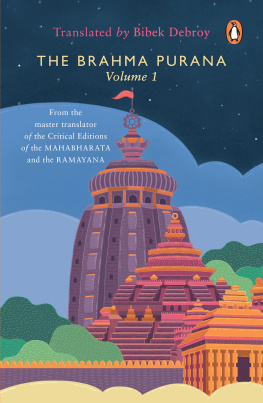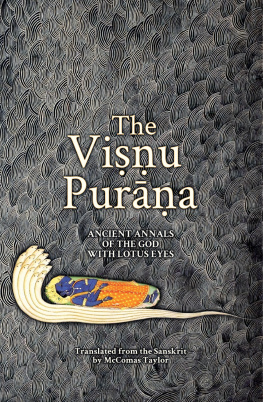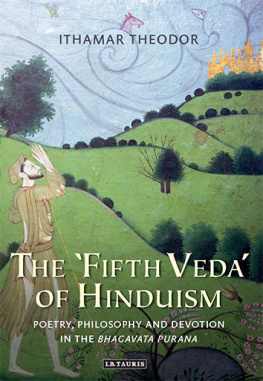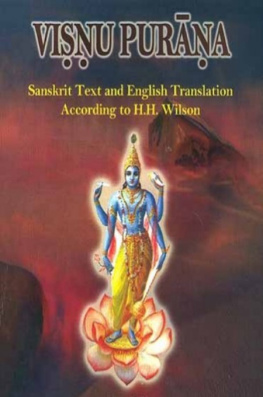THE
GARUDA PURA
(S RODDH RA)
WITH ENGLISH TRANSLATION
BY
ERNEST WOOD
AND
S.V. SUBRAHMANYAM
AND
AN INTRODUCTION FROM SRIS CHANDRA VASU
1911
The Garuda Purana by Ernest Wood and S.V. Subrahmanyam.
This edition was created and published by Global Grey
GlobalGrey 2019

globalgreyebooks.com
Contents
Introduction
This Garu a Pur a Srodhhra (Extracted essence of the Garu a Pur a) was compiled or written by one Navanidhirma, son of r Hari Nrya a, who lived in the city of Jhunjhu , which was ruled by a King r Skhallaj. It was done for the helping of those who cannot understand the difficult earlier works; but itself is not easy to understand, and required much labour, the author informs us. It is entirely originally written, he says, and comprises the results of very deep study of the sacred books, and is the extracted essence of them on the subjects with which it deals.
It is used all over India at funeral ceremonies, but some are afraid to read it on other occasions, thinking it inauspicious.
CHAPTERS I to VII deal with Hells.
CHAPTERS VII to XIII deal with Ceremonies for the dead.
CHAPTER XIV deals with Heaven.
CHAPTERS XV & XVI deal with Yoga and liberation.
The neo-theosophists, among the great good they have done to the world, have revived the idea that Hell is a living reality, and not a superstitious fiction, created by a designing priestcraft, to keep Humanity on its good behavior. Among the educated, with the vanishing of the belief in an after-life, has vanished also the belief in Hell. But owing to the labors of the Psychical Research Society and similar other bodies, there are few educated persons now, who deny the existence of the afterlife, as they used to do some thirty years back. But though the belief in after-life has revived, yet the cognate belief in Heaven and Hell is still very vague. Our Hindu Puranas, however, among the great mass of rubbish that they contain, have always been very clear on this question of Heaven and Hell. Serious writers of law books also like Yjavalkya and Vi u have described as-seriously the existences of various Hells, as they have done the various joys of Heaven. No doubt, the subject of Hell is not a very savoury one, and nervous persons have always fought shy of studying this unpleasant department of existence. But, pleasant or unpleasant, the science does not take into account the human feelings. No one is forced to study the subject, unless he feels strong enough to do so, as no one is bound to study Medicine, unless he is prepared to face the scenes of the dissecting room.
The question then is, do these hells really exist? If so, where? This is a question of fact, and must be decided like all questions of fact, on the evidence of reliable witnesses who have, from personal experience, described this region. To a Hindu there is needed no greater testimony than that of Yogi Yjavalkya who, in the Pryachitta Adhyya of his law book, mentions 21 hells. The author of Vi u Sm iti also has followed in his footsteps. Hell, then, according to Hindu seers, is a particular locality walled off from the surrounding regions of space by the messengers of Yama, the ruler of Hell. Within this particular space so specially guarded, no joy can enter. It is a region of pain--sharp. intense and severe. Sinners clothed in their painful bodies (jtana deha)--replica of their physical bodies, though made of subtler matter, suffer the punishments deserved by their sins. But there is one distinguishing mark between the Hindu idea of Hell and that of votaries of Semitic creeds. The punishment in Hell is not eternal. It is Reformatory and Educative. The hell punishment is not remembered by the soul when it is re-born, no more than it remembers the joys of heaven. But the permanent educative effect remains in that part of the sold--called the conscience. The natural fear, which certain souls feel at the sight of temptation to sin, is the result of the finer development of conscience, in the furnace of hell-fire. This is the permanent gain which the soul has acquired, and which it will never lose through ages to come, by passing through the bitterness of the valley of Yama--the merciful ruler of Hell.
Where is then this Hell situated? According to Hindu belief, its locality is in the astral region of the physical South Pole, as the Heaven is situate in the astral region of the physical North Pole. As a prison house is a prison only to the criminal, but not to the visitor, who goes there on his mission of mercy and charity, so Hell is a place of punishment and pain only to the sinners and not to those who go there on similar missions. The readers of the Hindu Sacred literature will no doubt remember the beautiful episode of Nachiketas going to Hell, and learning from its Ruler the secret of cosmic evolution, miscalled the secret of death.
The twenty-two hells are described in the Vi u Sm iti.
(See Sacred Books of the East, Vi u Sm iti, pp. 140-141, verse 22, Lohachraka).
After being thus purified by Hell-fire, the soul is re-born with keener conscience and under circumstances where it can, if it so chooses, make better use of its faculties. Says Yjavalkya in verse 218 of the Third Adhyya that the lords of mercy place such souls in very favourable circumstances afterwards.
But if the soul so favourably placed, omits to do good action or commits evil deeds again, and leaves its senses unrestrained, there is again a fall for that soul, as is mentioned in the next verse.
Is there any physical Hell also, or is it in the astral plane only? As Heaven is both physical and astral, and as the Svarga is on the physical plane also, where the great i is like Vysa, Avathman, Mrka deya and others are said to be still living in their physical bodies, so there are physical hells also, though not known as Hells. What are these prison houses in every well-governed community but physical hells? What is this outcasting by the society, but making one feel the torture of hell, in fact Gautama in his law book definitely calls this stage hell, and some say that Gautama did not believe, in another form of hell.
Thus the fact of concrete existence of hell cannot be doubted. Leaving the testimony of Hindu seers aside, in modern times we have the evidence of a hard-headed man of science like Swedenborg, of a refined artist and poet like Dante, and the great sage Rmk i na Paramaha sa.
Is there any means by which a man may save himself from the pains of hell? On this point, our ancient authors held different opinions. One class of thinkers held the view that sin could not be expiated by any act of man, however meritorious it be in its nature, but one must suffer the full consequences of his sins. The later view, which has gained ascendency now, is that for the intentional mortal sins--kma k itamahptaka,--there is no penance, except the death penance, which can save the man from future troubles. Several kinds of death penances are described in our law books, and in this age, a very salutary rule is laid down by the pa its that no death penance should ever be described, if a sinner asks the pa it for the appropriate penance of his sin. Thus in certain cases of incest, the only operative penance is to embrace a red-hot iron image and die in that way. Similarly, the penance for drinking spirituous liquors is death by drinking boiling liquors or butter. But no Pa it is allowed, by the rule of the present Iron age, to describe these death penances to any sinner. The result therefore, is that according to the law, every mortal sinner must pass through the period of purificatory process of hell. For minor sins, the rule is different. The after-life consequences can be warded off by appropriate penances. And here is a rich field which the Brhmi priestcraft of India, preying on the gullibility of its votaries, has exploited to its extreme extent. For every sin, there is a penance, and also a pilgrimage, with its concomitant result in the shape of so much fee (dak i ) to be paid to the Brhmi .
Next page
